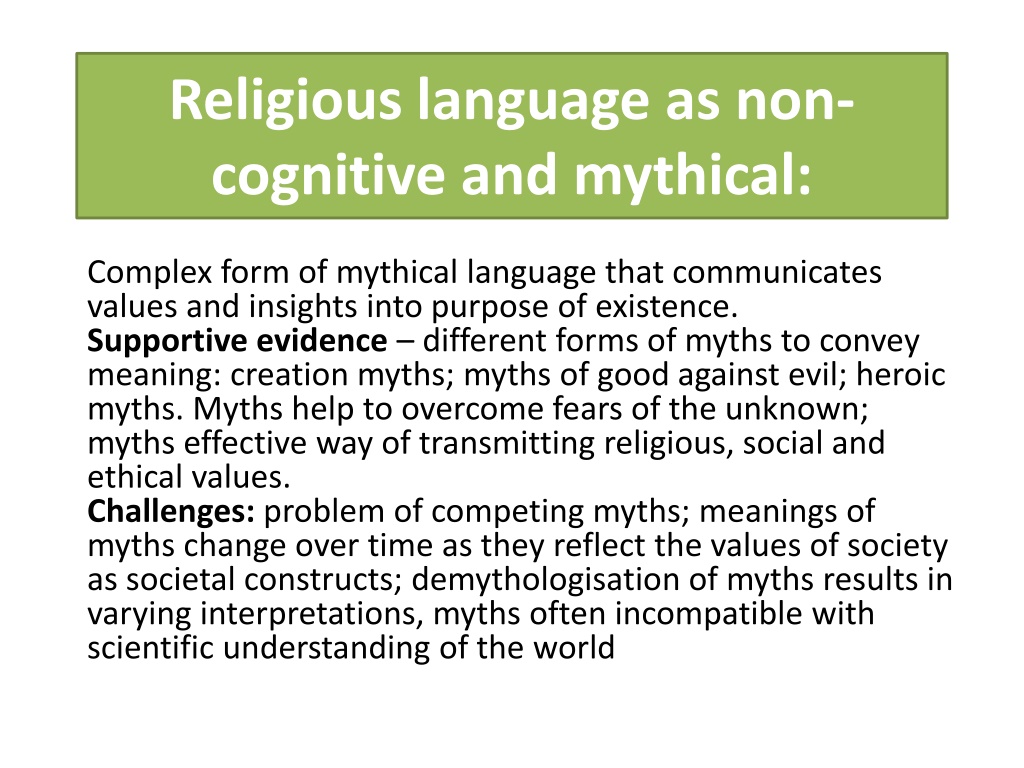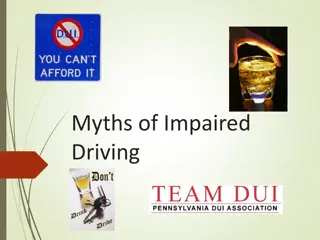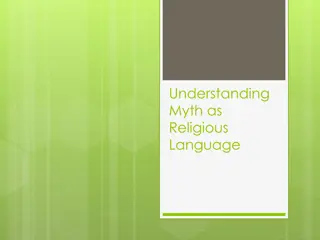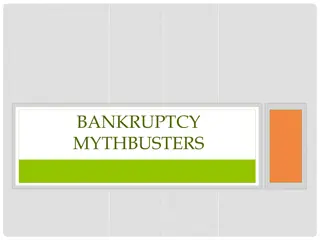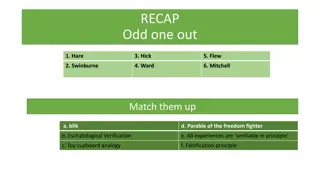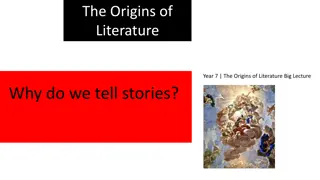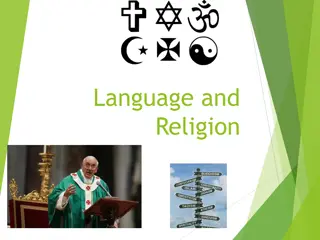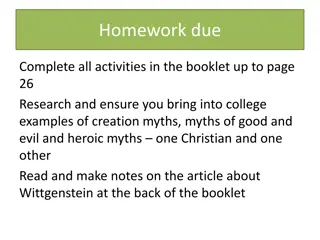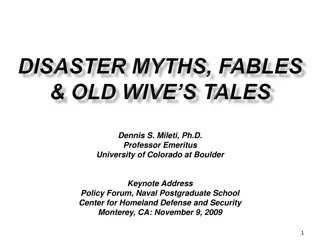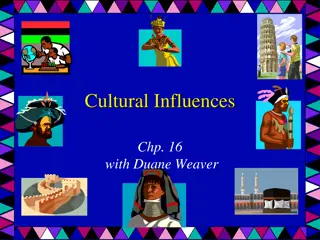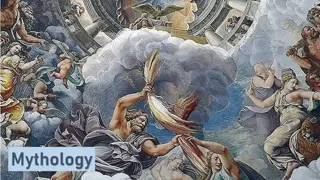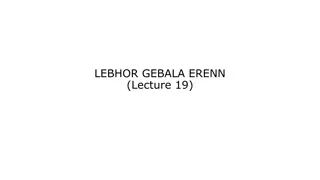Exploring the Role of Myths in Religious Language
Religious language is often non-cognitive and mythical, using complex forms of myths to communicate values and insights into the purpose of existence. These myths, such as creation myths and myths of good versus evil, help transmit religious, social, and ethical values while also addressing fears of the unknown. Challenges include competing myths and evolving meanings that reflect societal values. Myths are symbolic and metaphorical, conveying deeper truths rather than literal facts, and can inspire faith, morality, and new understandings.
Download Presentation

Please find below an Image/Link to download the presentation.
The content on the website is provided AS IS for your information and personal use only. It may not be sold, licensed, or shared on other websites without obtaining consent from the author. Download presentation by click this link. If you encounter any issues during the download, it is possible that the publisher has removed the file from their server.
E N D
Presentation Transcript
Religious language as non- cognitive and mythical: Complex form of mythical language that communicates values and insights into purpose of existence. Supportive evidence different forms of myths to convey meaning: creation myths; myths of good against evil; heroic myths. Myths help to overcome fears of the unknown; myths effective way of transmitting religious, social and ethical values. Challenges: problem of competing myths; meanings of myths change over time as they reflect the values of society as societal constructs; demythologisation of myths results in varying interpretations, myths often incompatible with scientific understanding of the world
Religious language as non-cognitive What does non-cognitive mean? A view of religious language that argues that its function is not to inform or contain factual information.
What are myths and metaphors? Use symbols, metaphor and allegory Story not true but explain truths Stories in Old Testament Metaphors convey meaning behind story
There are three senses in which a myth could convey a religious truth page 21 Read page 21, make notes under these headings. Myths can inspire faith and morality Myths can provide a way for believers to accept religion and science to Myths open up new levels of understanding Recap complete tasks 23 and 24 Remember Scholars Examples from religious language
Supporting evidence for the use of mythical language Different forms of myths to convey meaning: creation myths; myths of good against evil; heroic myths. Myths help to overcome fears of the unknown; myths effective way of transmitting religious, social and ethical values.
What is an aetiological myth? 23 Myth about how things came about and were caused origin of universe and components
Examples of myth task 25 Creation Other myths good and evil and hero myths Christian 23 and 24 Other religion or culture
Common themes in creation myths Read the creation myths Identify common themes Chaotic formless state existed before the creation of the universe (body of water) A god who exists in a void performs some action which results in the universe coming into being Human appear, usually in the final stage This appearance reflects a link between humans and the supernatural creative force
Examples of myths of good and evil The story of Job This is a good example to use as we referred to it last year when we studied the Problem of Evil and Suffering. Hercules
Supporting evidence Myths help to overcome fears of the unknown; myths effective way of transmitting religious, social and ethical values.
Supporting evidence? 25 To reject mythological language is to reject many religious beliefs underlying it Gilkey argued for the continued use of myth in the modern scientific world and the continued relevance of symbols and myths in the modern world can convey God s power e.g. creation Through the language of myth we see how our thinking has evolved Even people who are not religious are still influenced by myths and symbols and they help us to interpret the world It is an easy way to understand abstract ideas Complete task 26
Supportive evidence different forms of myths to convey meaning: creation myths; myths of good against evil; heroic myths. Myths help to overcome fears of the unknown; myths effective way of transmitting religious, social and ethical values.
Challenges to the use of myths Look at the list made of inherent problems of religious language made from the first lesson. Which of these has apparently been solved through the use of myths? Which remain a problem?
Challenges? 26 problem of competing myths; meanings of myths change over time as they reflect the values of society as societal constructs; demythologisation of myths results in varying interpretations, myths often incompatible with scientific understanding of the world
Competing myths Meanings of myths lost in translation Challenges: Myths often incompatible with scientific understanding of the world Demythologisation of myths results in varying interpretations Bultmann
Explain why some Christians are critical of interpreting religious language as myth. Discuss your ideas in your group Write on post its Stick on board Create a class list of ideas
How successfully do the ideas of myths, symbols and metaphors defend religious language from the accusation that is meaningless because it can t be verified or falsified? Successful Unsuccessful Myths are meaningless stories Discuss
Symbols help people to understand the mystery of God Discuss
Make notes on Braithwaites view of religious language as moral discourse
Homework Complete all activities in the booklet up to page 26 Research and ensure you bring into college examples of creation myths, myths of good and evil and heroic myths one Christian and one other Read and make notes on the article about Wittgenstein at the back of the booklet
